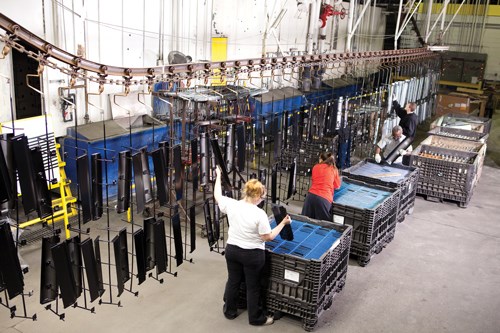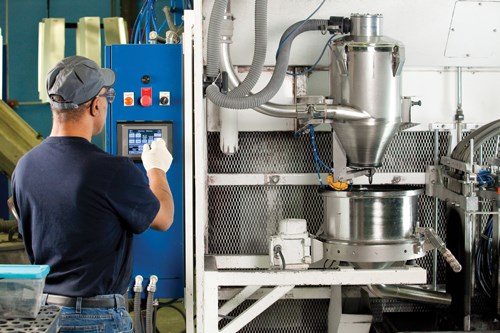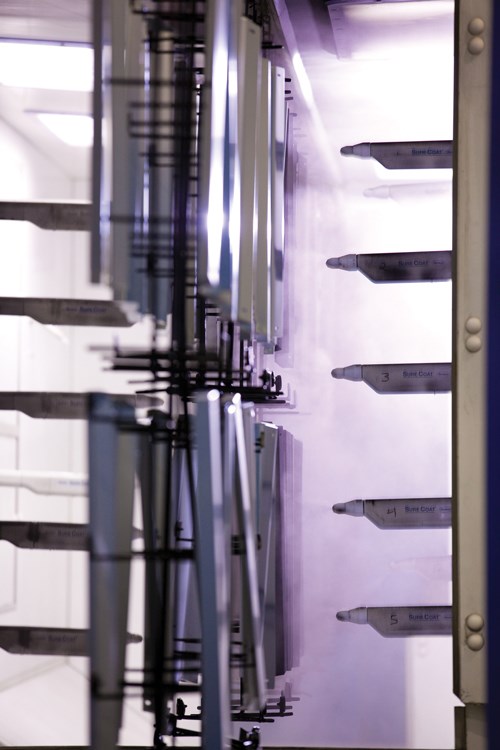Who would have thought that White Castle—home to the savory indulgency of working men and women everywhere, the “slider”—would have so much in common with paint, powder coating and electrocoating?
It’s not so much in the 500 million hamburgers it sells each year, but rather in the custom equipment it puts in its own restaurants that the company manufactures itself at its headquarters in Columbus, Ohio.
Founded in 1921, White Castle runs its own equipment manufacturing and finishing company—PSB Co.—which was formed in 1934 to make kitchen equipment used for cooking and storage at its unique hamburger restaurants.
As time passed over the last 80 years, PSB became so proficient in its manufacturing of restaurant kitchen components that the company began doing work for other companies, adding assembly line production and powder coating and painting capabilities.
It was PSB’s attention to detail and craftsmanship that attracted major industrial customers, such as appliance, automotive, building products and lawn equipment manufacturers.
Today, the company has at its disposal powder coating and e-coating lines, laser cutting, sheet metal fabrication, stainless steel fabrication, welding and grinding capabilities.
But when PSB began recently looking at its two facilities in the Midwest—Columbus and Dayton, Ohio—and one in the Southeast in Rome, Ga., the company began to think it could improve operations and increase efficiencies.
Highlighting Process Inefficiencies
At the beginning of 2010, PSB teamed with Profit Finders, a continuous improvement company specializing in data collection and analysis, to look at ways to increase process efficiencies.
“Lean manufacturing is a never-ending continuous improvement process focused on striving for perfection and driving out waste,” says Tom Fabek, general manager of Profit Finders. “The process requires data, the use of problem-solving techniques, and group decision-making.”
Dave Rife, general manager at PSB, said a Profit Finders program was designed for PSB’s pre-treatment and paint line operations to uncover process paradigms that siphon off bottom-line profits. It examined cost reduction opportunities in natural gas, electricity, water and chemicals.
Using its proprietary monitoring and data collection technology, Profit Finders collected detailed cost and process data to document PSB’s current operations and establish benchmarks.
Fabek says once these baseline parameters were set, Profit Finders worked with PSB to design a course of action to drive down usage—and in some cases change methods—which ultimately resulted in significant cost savings for PSB.
“Profit Finders technology has shown us ways to improve our productivity without compromising our commitment to quality,” Rife says. “We have been extremely cautious about making any changes to our process parameters, but after completing rigorous validations of the changes, we ultimately saw that all of our quality parameters stayed the same and our processes were improved.”
Discovering Hidden savings
“PSB worked with us to look deep into areas of the plant that typically are not questioned,” Fabek says. “Volumes of data were collected on a daily basis, with details logged by the minute.”
Profit Finders’ engineers and analysts examined the data to identify trends and patterns, and made recommendations on how to improve processes.
“They give us the ability to look at things we never had the opportunity to look at before,” Rife says. “They continue to point out areas where we can make changes that result in cost savings, which have also better positioned us to be more competitive for our customers.”
One of the areas monitored by Profit Finders was PSB’s energy use related to the temperatures of chemical tanks in its five-stage wash line.
“When analyzed, the data indicated that tank burners were being fired up sooner than required and then being shut down later than necessary,” Fabek says.
As a result, PSB altered its startup and shutdown procedures, saving as much as two hours per day of runtime per burner. With these changes, the company has realized significant savings on energy costs.
“We have seen somewhere from an 18 to 21 percent reduction in our utility costs in our pretreatment system alone,” Rife says. “With natural gas and electric prices where they are today, this direct impact to our profit margins is a major competitive advantage for PSB.”
Waste Not, Want Not
Another significant area of savings has been the company’s chemical consumption. As Profit Finders began working with PSB to monitor its wash line, the company identified opportunities with regard to chemical usage.
The process involved taking continuous concentration readings and using flow meters to capture details on chemical consumption and make up water additions. After analyzing the data, Profit Finders was able to help PSB reduce process variations, which improved quality and also reduced chemical costs.
“We are now able to purchase chemicals ‘just in time’ since consumption is predictable,” says Brian Chaffin, lead maintenance technician at PSB. “We estimate a savings of approximately $20,000 on chemicals on a quarterly basis since we have been working with Profit Finders.”
In addition to analyzing the data, Profit Finders worked hand-in-hand with PSB process engineers to maintain specification in the process. Collected data is automatically fed via Internet to a secure data center where Profit Finders’ analysts and PSB operators can readily access it from any PC.
“Profit Finders has really become an extension of our team and they have proven themselves time and again,” Chaffin says. “When you’re working with somebody that is so knowledgeable of their system, you start building a really confident and trusting relationship with them.”
Removing Guesswork
“Our technology takes the guesswork out of process issues with the collection of hard data,” says Ed Jones, Profit Finders senior VP of business development. “By providing real-time data, we’ve helped PSB take efficiency to the next level.”
In addition, PSB also receives real-time alarms via text message and email in the event a process parameter begins to drift. Normally, alarms are only triggered when a line is running; however PSB requested certain alarms be generated during off hours. Profit Finders modified the normal alarming program to accomplish this and help PSB catch issues where utilities are left on during off hours.
“The alarms and the access to our real-time data have helped tremendously with our troubleshooting when we have performance issues,” Chaffin says. “We are able to react quicker because we know exactly where the problem is, and this eliminates a lot of down time.”
With Profit Finders’ technology, PSB has been able to identify multiple opportunities to reduce operating costs without sacrificing the high level of quality that has been a mainstay with the company for more than 75 years.
“If anything, quality levels have been increased during the waste elimination process,” Fabek says.












.jpg;maxWidth=300;quality=90)










